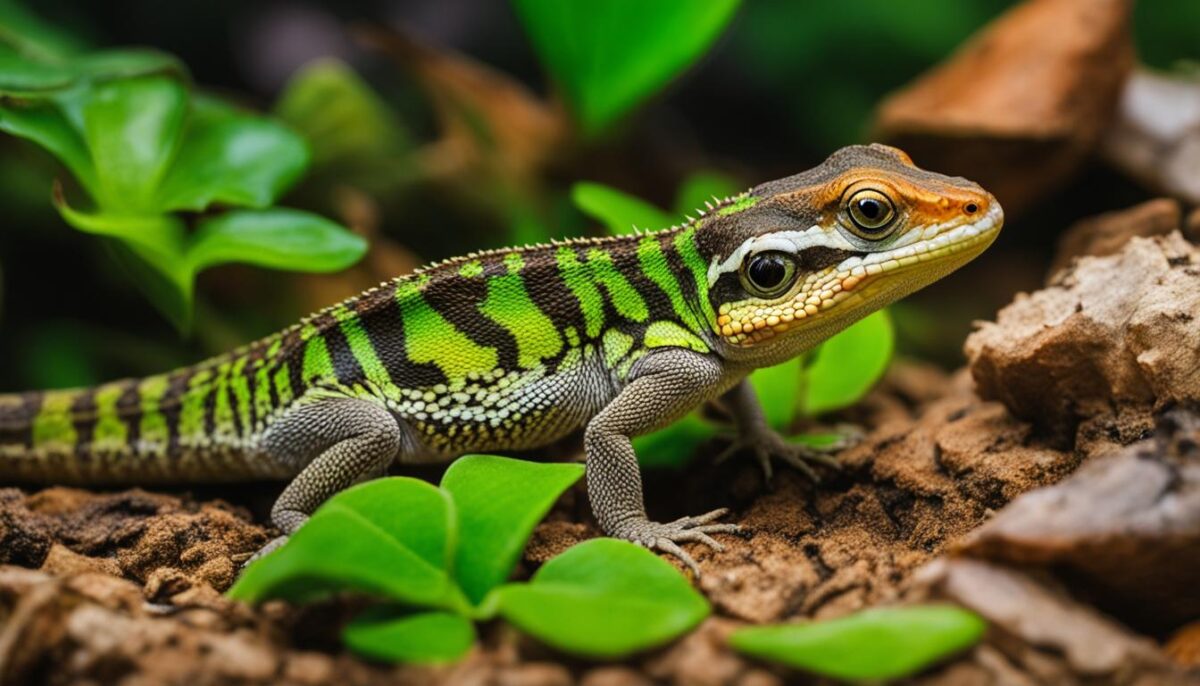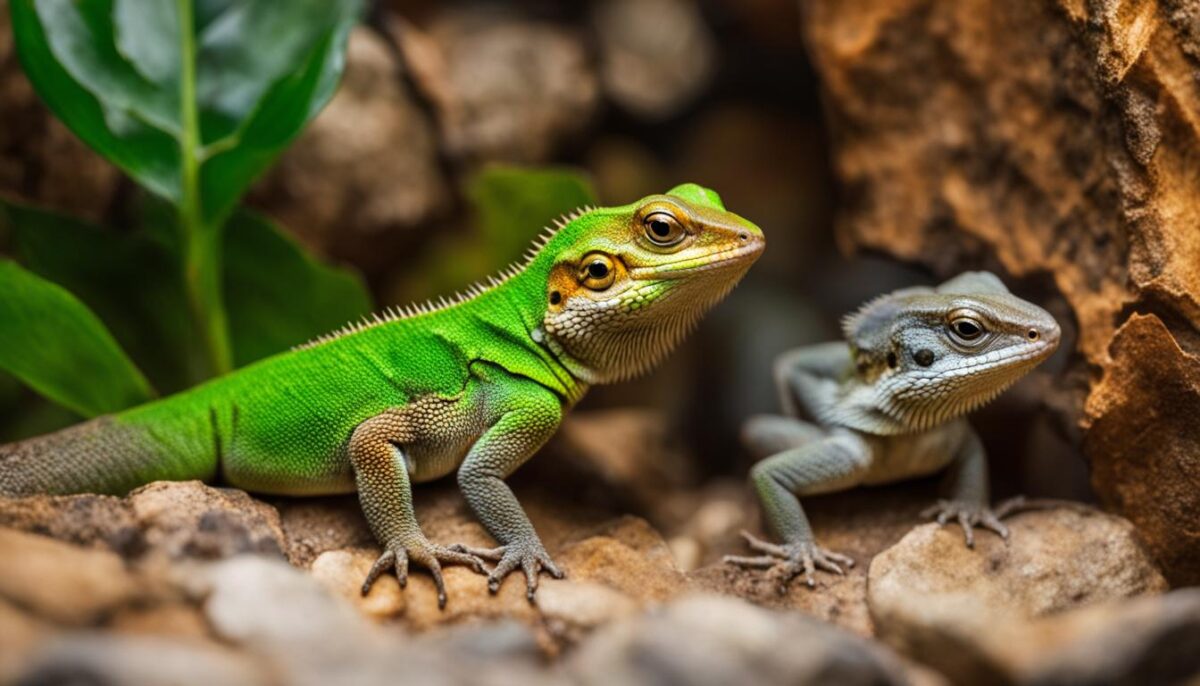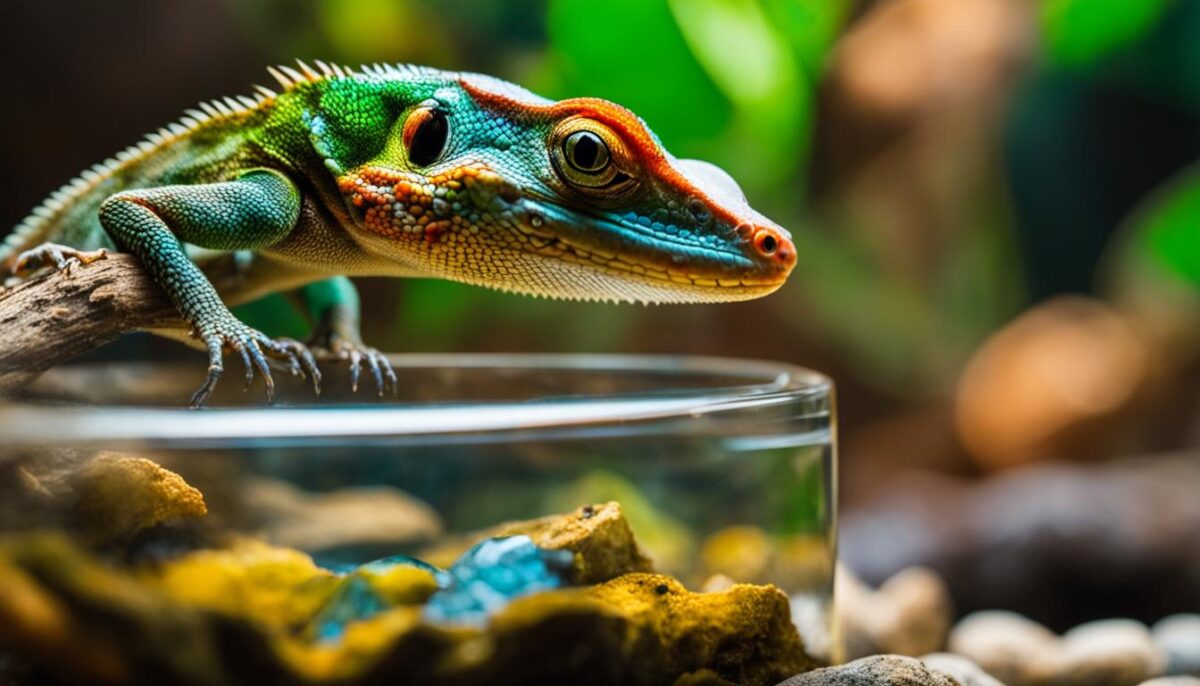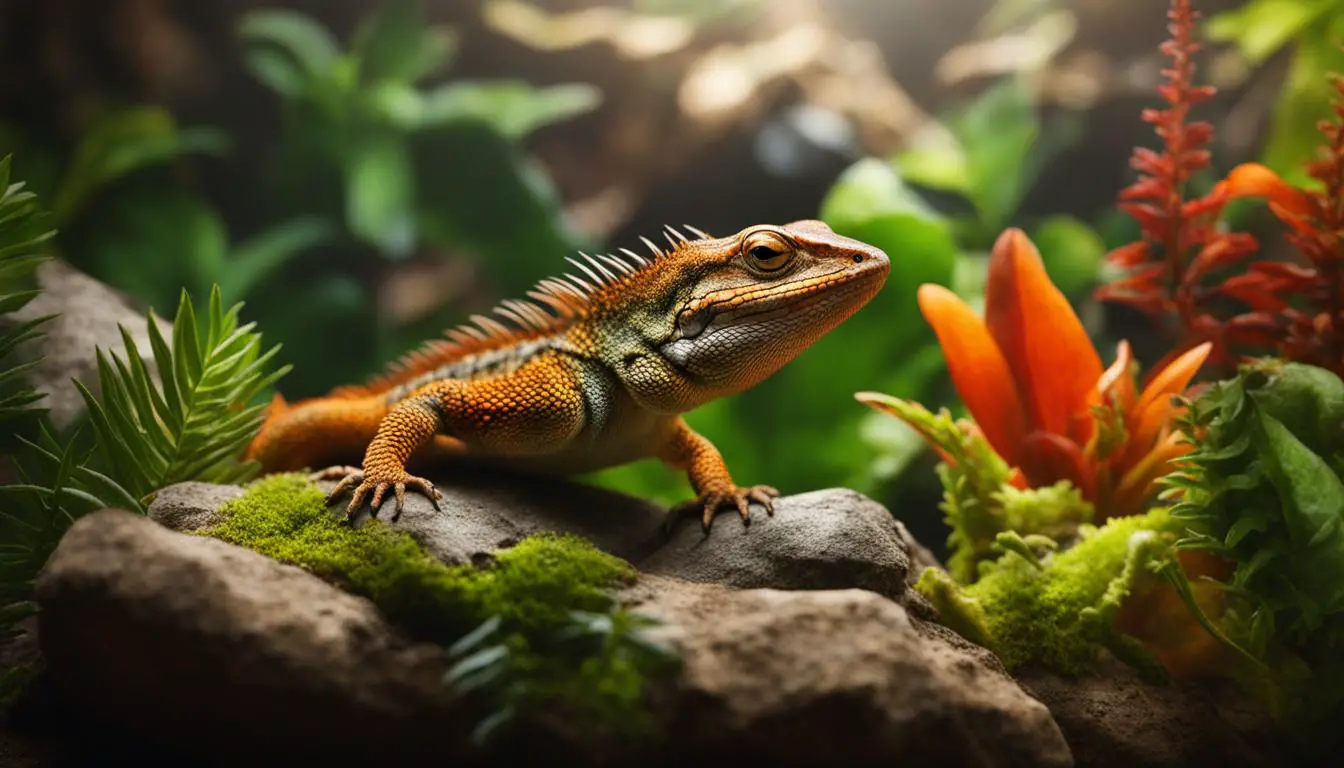Reptiles make unique and entertaining pets, especially for those who cannot have traditional pets like cats or dogs. However, not all reptiles are suitable for everyone, as some can grow quite large. In this article, we will explore the world of small lizards as pets and provide a guide to choosing the best reptile companion that will stay small throughout its entire life.
Key Takeaways:
- Small pet reptiles are beginner-friendly and easier to handle and care for.
- They require smaller enclosures and have a more affordable diet.
- Leopard geckos, crested geckos, and other small lizard species make excellent pets.
- Consider other small reptiles like frogs, snakes, and turtles as well.
- Proper care, housing, and handling are crucial for the health and well-being of small pet reptiles.
Small Lizards as Pets
Why Choose Small Pet Reptiles? Benefits and Considerations
Small pet reptiles offer several benefits for pet owners. They are easier to handle and care for, making them ideal for beginners. They are also more convenient when it comes to housing, as they require smaller enclosures. Additionally, small reptiles are cheaper to feed, with a diet consisting of small bugs rather than larger animal protein items.
However, it’s important to consider the long-term commitment and the specific needs of each reptile before making a decision. While small reptiles may be easier to care for, they still require a dedicated owner who can provide the correct environment and meet their specific needs. It’s essential to research and understand the individual requirements of each reptile species to ensure their health and well-being. pet lizards
Why Choose Small Pet Reptiles? Benefits and Considerations
“Small pet reptiles are a great choice for those looking for a unique and low-maintenance pet. They are fascinating creatures that can provide endless entertainment and companionship. Plus, their small size makes them a perfect fit for any home or apartment. Just remember to do your research and choose a reptile that matches your lifestyle and commitment level.”
When choosing a small pet reptile, it’s also important to consider your own preferences and capabilities. Some reptiles may have specific care requirements or temperaments that may not be suitable for everyone. It’s essential to find a reptile that matches your interests and lifestyle to ensure a successful and fulfilling pet-owner relationship.
In summary, choosing small pet reptiles can offer many benefits, including ease of care, cost-effectiveness, and convenience in terms of housing. However, it’s important to understand the long-term commitment and individual needs of each reptile species before bringing one home. By doing thorough research and selecting a reptile that aligns with your preferences and capabilities, you can enjoy the unique companionship and wonder that small pet reptiles provide.
How Big Can Pet Reptiles Get? Understanding Size and Housing Requirements
When considering small lizards as pets, it’s important to understand the potential size they can reach. While some reptiles can grow quite large and require spacious enclosures, there are several species that stay small throughout their lives, making them ideal for pet owners with limited space.small reptiles as pets
Leopard geckos and crested geckos are two popular small lizard species that are suitable for pet owners. Leopard geckos typically reach a length of 7 to 10 inches, while crested geckos can grow up to 8 inches. These reptiles thrive in smaller enclosures, ranging from 10 to 20 gallons, making them easier to house in apartments or smaller living spaces.
It’s important to note that the housing requirements for small lizards may vary depending on the species. Some reptiles may require specific temperature and humidity levels, as well as substrate and lighting options. Researching the specific needs of each species is essential to provide the appropriate housing and ensure the well-being of the reptile.
| Lizard Species | Size | Recommended Enclosure Size |
|---|---|---|
| Leopard Gecko | 7-10 inches | 10-20 gallons |
| Crested Gecko | Up to 8 inches | 10-20 gallons |
By understanding the growth potential and housing requirements of small reptiles, pet owners can make informed decisions when choosing the best lizard companion. Providing the appropriate enclosure size and environment will ensure their comfort and well-being, allowing them to thrive in a smaller living space.
7 Small Reptiles That Stay Small: Characteristics and Care
When it comes to choosing a small reptile as a pet, there are several options that stay small throughout their lives. These small reptiles are not only compact but also have unique characteristics that make them fascinating companions. Let’s take a closer look at some of the popular small reptiles that are commonly kept as pets.
Leopard Gecko
| Characteristics | Care |
|---|---|
| Size: 7-10 inches | Temperature: 88-92°F during the day, 75-80°F at night |
| Appearance: Spotted or striped pattern, various colors | Humidity: 20-40% |
| Behavior: Nocturnal, docile | Diet: Insects such as crickets and mealworms, supplemented with calcium and vitamins |
Leopard geckos are known for their gentle nature and ease of handling, making them ideal for beginners. With proper care and a suitable enclosure, they can live up to 15-20 years in captivity.
Green Anole
| Characteristics | Care |
|---|---|
| Size: 5-8 inches | Temperature: 75-85°F during the day, 65-70°F at night |
| Appearance: Bright green color, ability to change color | Humidity: 60-70% |
| Behavior: Arboreal, active during the day | Diet: Insects such as crickets and small worms, supplemented with calcium and vitamins |
Green anoles are visually striking lizards that can add a touch of vibrant color to your reptile collection. They require a well-ventilated enclosure with plenty of climbing opportunities.
House Gecko
| Characteristics | Care |
|---|---|
| Size: 3-4 inches | Temperature: 75-85°F during the day, 65-75°F at night |
| Appearance: Various colors, ability to climb walls and ceilings | Humidity: 60-70% |
| Behavior: Nocturnal, vocalization | Diet: Insects such as small crickets and fruit flies |
House geckos are small, lively reptiles that are known for their ability to climb almost any surface. They are relatively easy to care for and can make captivating pets.
Five-Lined Skink
| Characteristics | Care |
|---|---|
| Size: 5-8 inches | Temperature: 75-85°F during the day, 70-75°F at night |
| Appearance: Dark body with bright blue or yellow stripes | Humidity: 60-70% |
| Behavior: Diurnal, active and curious | Diet: Insects such as crickets, mealworms, and small spiders |
Five-lined skinks are small reptiles with striking patterns and colors. They are suitable for owners who want an active and sociable companion that can be observed during the day.
Crested Gecko
| Characteristics | Care |
|---|---|
| Size: 6-8 inches | Temperature: 72-78°F during the day, 65-70°F at night |
| Appearance: Crest on the head, various colors and patterns | Humidity: 60-80% |
| Behavior: Arboreal, vocalization | Diet: Fruit-based powdered diets, supplemented with insects |
Crested geckos are known for their unique appearance and docile nature. They are a popular choice among reptile enthusiasts due to their low-maintenance requirements. best small lizards for pet owners
Pygmy Chameleon
| Characteristics | Care |
|---|---|
| Size: 2-3 inches | Temperature: 75-85°F during the day, 65-75°F at night |
| Appearance: Various colors, ability to change color | Humidity: 75-85% |
| Behavior: Arboreal, slow-moving | Diet: Insects such as small crickets and fruit flies |
Pygmy chameleons are miniaturized versions of their larger counterparts, making them perfect for small enclosures. They require specific humidity levels and a well-planted enclosure.
Rosy Boa
| Characteristics | Care |
|---|---|
| Size: 2-3 feet | Temperature: 80-85°F during the day, 70-75°F at night |
| Appearance: Various colors, smooth and shiny scales | Humidity: 50-60% |
| Behavior: Nocturnal, docile | Diet: Small mammals such as mice |
Rosy boas are small snakes that have a gentle disposition and are relatively easy to care for. They make great pets for snake enthusiasts who prefer a manageable size.
These are just a few examples of small reptiles that make wonderful pets. Each species has its own unique care requirements, so be sure to do thorough research and provide a suitable environment for your small reptile companion. By understanding their characteristics and meeting their specific needs, you can create a happy and healthy life for your pet lizard. choosing small lizards as pets
Other Small Pet Reptiles to Consider: Frogs, Snakes, and Turtles
While lizards are popular choices for small pet reptiles, there are other options to consider as well. Most frogs stay small and can make interesting and unique pets. Garter snakes and ring-necked snakes are small snake species that are suitable for beginners. Additionally, there are some small turtle species that can be kept as pets, although they require specific care and housing requirements. It’s essential to research and understand the needs of each reptile species before making a decision.
Frogs
When it comes to small pet reptiles, frogs provide a fascinating and low-maintenance option. Most frogs stay small throughout their lives, making them ideal for pet owners with limited space. They come in a variety of colors and patterns, adding a vibrant touch to any reptile collection. Some popular small frog species include the Red-eyed Tree Frog, Dart Frogs, and White’s Tree Frog. Keep in mind that frogs require a moist environment and a varied diet consisting of live insects.
Snakes
For those interested in small reptiles with a unique charm, garter snakes and ring-necked snakes are excellent choices. Garter snakes are known for their docile nature and are relatively easy to care for. They come in various colors and patterns, making them visually appealing pets. Ring-necked snakes are smaller in size but equally captivating. These snakes are generally non-aggressive and can adapt well to captivity. It’s important to provide the appropriate enclosure and temperature gradient for snakes, as well as a diet consisting of appropriately sized rodents.
Turtles
While turtles may not be the first reptile that comes to mind for small pet options, there are some species that stay small and can be suitable for captivity. Box turtles, for example, can thrive in a well-designed enclosure and have a lifespan of up to 50 years. Musk turtles and painted turtles are also small species that can be kept as pets. It’s essential to provide turtles with an appropriate aquatic environment, including a basking area, proper filtration, and a balanced diet consisting of both plant matter and protein.beginner-friendly pet lizards
| Reptile Species | Size | Housing Requirements | Diet |
|---|---|---|---|
| Red-eyed Tree Frog | Small (1.5 to 2.5 inches) | Tall, well-ventilated terrarium with plants and branches | Live insects such as crickets and fruit flies |
| Dart Frogs | Small (0.5 to 2 inches) | Terrestrial or arboreal habitat with dense vegetation and moisture | Small invertebrates like ants, termites, and fruit flies |
| White’s Tree Frog | Small to medium (2 to 4 inches) | Large, vertically-oriented terrarium with climbing branches and water tray | Live insects, small vertebrates, and occasional fruits |

“Frogs make fascinating pets, and their vibrant colors and unique behaviors can bring joy to any reptile enthusiast.” – Reptile Expert
Before bringing any small reptile into your home, it’s crucial to research and understand their specific care requirements. Each species has its own unique needs in terms of housing, temperature, humidity, and diet. Providing the proper care and attention to these small reptiles will ensure their health and well-being, allowing you to enjoy their presence for years to come.
The Importance of Proper Care and Housing for Small Pet Reptiles
Proper care and housing are crucial for the health and well-being of small pet reptiles. These unique creatures have specific requirements that must be met to ensure their comfort and longevity. One important aspect is providing the appropriate enclosure size and environmental conditions that mimic their natural habitat. This includes maintaining the right temperature, humidity levels, and lighting. A well-designed habitat will not only keep the reptile healthy but also provide them with mental stimulation.
Another critical factor in caring for small pet reptiles is their diet. Each species has specific dietary needs that must be met to ensure proper nutrition. Some reptiles require a diet of live insects, while others may need a combination of insects and plants. It’s crucial to research and understand the dietary requirements of your specific reptile to ensure they are receiving the necessary nutrients.
Regular vet check-ups are essential for small pet reptiles. Reptiles are susceptible to various health issues, and early detection is key to preventing serious conditions. A reptile veterinarian can provide guidance on vaccinations, parasite prevention, and general health examinations. They can also offer advice on handling and stress reduction techniques to ensure the well-being of your reptile.
The Benefits of Proper Care and Housing
Providing proper care and housing for small pet reptiles offers numerous benefits. By ensuring they have a suitable environment and diet, you can help prevent health issues and promote their overall well-being. A well-maintained habitat and a nutritious diet can also enhance their natural behaviors, making them more active and engaging companions.
Furthermore, proper care and housing allow you to form a strong bond with your reptile. Reptiles are intelligent creatures that can recognize and respond to their owners. By providing them with a safe and comfortable environment, you can build trust and establish a positive relationship. Regular handling, when done correctly and with respect for their needs, can further strengthen this bond.
| Benefits of Proper Care and Housing: | Caring for Small Lizards as Pets: |
|---|---|
| Prevents health issues | Research specific reptile requirements |
| Promotes physical and mental well-being | Maintain appropriate temperature and humidity levels |
| Enhances natural behaviors | Provide a nutritious diet |
| Strengthens the bond between owner and reptile | Regular vet check-ups |
Proper care and housing are essential for the health and happiness of small pet reptiles. By understanding and meeting their specific needs, you can provide them with a fulfilling and enriched life. Remember to always do thorough research and consult with experts to ensure you are providing the best care possible for your small reptile companion.
Tips for Handling and Bonding with Small Pet Reptiles
Handling and bonding with small pet reptiles can be a rewarding experience that allows you to develop a special connection with your reptile companion. However, it’s important to approach handling with caution and respect for their needs. Here are some tips to help you handle and bond with your small pet reptile:
- Gradual acclimation: When you first bring home your small pet reptile, give them some time to adjust to their new environment. Gradually introduce yourself by placing your hand near their enclosure and allowing them to approach you at their own pace.
- Gentle handling: When handling your small reptile, make sure to use slow, gentle movements. Avoid sudden gestures or squeezing them tightly, as this can cause stress or injury. Support their body properly and handle them close to the ground or over a soft surface to prevent accidental falls.
- Frequent positive interactions: Regular socialization is essential for bonding with your small pet reptile. Spend time with them outside of their enclosure, allowing them to explore in a safe and supervised environment. Offer treats or their favorite foods as rewards for positive behavior.
It’s important to note that not all small pet reptiles enjoy handling, and some may be more shy or skittish than others. Respect their boundaries and be patient with their progress. If your reptile shows signs of stress or discomfort during handling, it’s best to give them some space and try again later.
Remember, each small pet reptile is unique, and their comfort levels with handling may vary. Take the time to observe and understand their behavior, and always prioritize their well-being above your desire to handle them.
By following these tips and establishing a trusting relationship with your small pet reptile, you can create a bond that will bring joy and fulfillment to both of you. Remember to be patient, gentle, and understanding, and enjoy the special companionship that small reptiles can offer.

Potential Costs and Commitment of Owning Small Pet Reptiles
Owning small lizards as pets can bring immense joy and wonder into your life. However, it’s essential to recognize the financial and time commitments that come with caring for these unique reptiles. While small reptiles may be more affordable to purchase compared to larger species, there are ongoing costs associated with their care and maintenance.
When considering the cost of owning a small pet reptile, it’s important to factor in expenses such as housing, heating, lighting, substrate, and food. The initial setup cost for an enclosure, including heating and lighting equipment, can vary depending on the size and specific needs of the reptile. Additionally, regular vet visits and health check-ups are crucial for ensuring the well-being of your small pet reptile, adding to the overall cost of ownership.
Alongside the financial commitment, owning a small pet reptile requires a long-term commitment of time and effort. These reptiles have specific care requirements, including temperature, humidity, lighting, and diet, which need to be consistently monitored and maintained. Additionally, small reptiles thrive when provided with mental stimulation and regular social interaction. This means dedicating time each day to handle, interact, and engage with your reptile to ensure their physical and emotional well-being.
| Costs of Owning Small Pet Reptiles | Considerations |
|---|---|
| Housing and Enclosure Setup | Investing in an appropriate enclosure, heating, and lighting equipment |
| Substrate | Providing suitable bedding material for reptile comfort and cleanliness |
| Food | Regularly purchasing a variety of feeder insects or appropriate reptile food |
| Veterinary Care | Budgeting for regular check-ups, potential health issues, and medication |
| Time and Attention | Dedication to daily care, interaction, and enrichment activities |
“Owning a small pet reptile can be a fulfilling experience, but it’s important to be prepared for the responsibilities that come with it. Financially, the cost of purchasing and maintaining an appropriate enclosure, heating, lighting, and food can add up over time. Additionally, the time commitment required to provide proper care, attention, and interaction should not be underestimated. It’s crucial to consider these factors before bringing a small pet reptile into your home.”
By carefully considering the potential costs and long-term commitment of owning small pet reptiles, you can ensure that you are fully prepared to provide the necessary care and resources for your reptile companion. It’s important to do thorough research, consult experienced reptile owners, and consider your lifestyle and budget before making the decision to welcome a small pet reptile into your life.

Resources for Further Research and Information
When it comes to researching small lizards as pets, there are numerous resources available that can provide valuable information and guidance. Whether you are a beginner or an experienced reptile owner, these resources can help you make informed decisions and ensure the well-being of your small reptile companion.
Online Care Guides and Forums
One of the best places to start your research is online care guides and forums dedicated to pet reptiles. These resources often cover a wide range of topics, including species-specific care, enclosure setup, feeding, and health concerns. Websites like Reptile Magazine and Reptiles Magazine have comprehensive care guides that can be a great starting point for understanding the specific needs of different small lizard species.
In addition to care guides, online forums provide a platform for reptile enthusiasts to share their experiences and knowledge. Joining these communities can give you access to a wealth of information, as well as the opportunity to ask questions and receive advice from experienced reptile owners.
Reputable Breeder Websites
When looking to purchase a small lizard as a pet, it’s important to find a reputable breeder who prioritizes the health and well-being of their animals. Reputable breeder websites can provide valuable information about the care requirements, temperament, and genetic background of the lizards they breed.
Take the time to research and vet different breeders before making a decision. Look for breeders who have positive reviews and testimonials, who are transparent about their breeding practices, and who prioritize the health and socialization of their animals. Reputable breeders will also be willing to answer any questions you may have and provide ongoing support throughout your journey as a reptile owner.
Local Pet Stores and Reptile Exhibitions
If you prefer hands-on experience and the opportunity to ask questions directly to professionals in the field, visiting local pet stores and reptile exhibitions can be a great option. Pet stores often have knowledgeable staff who can provide guidance and recommendations based on your specific needs and preferences.
Reptile exhibitions, such as reptile shows or expos, bring together a wide variety of reptile enthusiasts, breeders, and vendors. These events offer the chance to see different small lizard species up close, learn from experts through educational seminars, and connect with other reptile owners in your area.
Consulting Experienced Reptile Owners or Herpetologists
While online resources and books can provide a wealth of information, there is no substitute for firsthand experience and advice. If possible, reach out to experienced reptile owners or herpetologists in your community. They can offer valuable insights into the specific care requirements, behavior, and potential challenges associated with owning small lizards as pets.
Attending local reptile clubs or joining online reptile communities can help you connect with these knowledgeable individuals. By building relationships with experienced reptile owners, you can benefit from their expertise and receive personalized guidance tailored to your unique situation.
Remember, researching small lizards as pets is an ongoing process. As new information and research emerge, it’s important to stay updated and adapt your pet care practices accordingly. By utilizing the resources available to you and continuously learning, you can provide the best possible care for your small reptile companion.
Conclusion
Owning small lizards as pets can bring a unique and fulfilling experience into your life. These fascinating reptiles offer a special companionship and are an excellent choice for pet owners with limited space. By understanding their specific care requirements, providing suitable housing, and establishing a bond through gentle handling, small pet reptiles can bring joy and wonder to your everyday life.
Remember, thorough research and informed decision-making are crucial when considering small lizards as pets. Take the time to learn about their individual needs, such as temperature, humidity, lighting, substrate, and diet. This will ensure their comfort and well-being, mimicking their natural habitat as closely as possible.
Whether you choose a leopard gecko, a crested gecko, a green anole, or any other small reptile, the rewards of owning a small lizard are worth the effort. Embrace the responsibility of being a pet reptile owner and enjoy the special bond that can develop between you and your scaly friend.
FAQ
Are small pet reptiles suitable for beginners?
Yes, small pet reptiles are ideal for beginners as they are easier to handle and care for compared to larger reptiles.
How big do small pet reptiles get?
Small pet reptiles, such as leopard geckos and crested geckos, stay small throughout their lives and typically require smaller enclosures ranging from 10 to 20 gallons.
What are some small lizard species that make good pets?
Some small lizard species that make excellent pets include leopard geckos, green anoles, house geckos, five-lined skinks, crested geckos, pygmy chameleons, and rosy boas.
Are there other small reptiles besides lizards that can be kept as pets?
Yes, frogs, garter snakes, ring-necked snakes, and certain small turtle species can also be kept as pets, although they require specific care and housing requirements.
What care and housing do small pet reptiles require?
Small pet reptiles have specific requirements for temperature, humidity, lighting, substrate, and diet. It’s important to provide the appropriate enclosure size and environmental conditions to ensure their comfort and mimic their natural habitat.
How can I bond with and handle my small pet reptile?
Bonding with small pet reptiles requires gradual acclimation, gentle handling, and frequent positive interactions. It’s important to be aware of their specific handling requirements and to avoid excessive stress or harm.
What are the ongoing costs associated with owning small pet reptiles?
Owning small pet reptiles involves costs for housing, heating, lighting, substrate, food, and regular vet visits. It’s important to consider the long-term financial responsibilities before deciding to own a small pet reptile.
Where can I find more information about small pet reptiles?
There are numerous online resources, such as care guides, forums, and reputable breeder websites, that provide information about small pet reptiles. Additionally, visiting local pet stores or reptile exhibitions can offer hands-on experience and access to professionals in the field.


